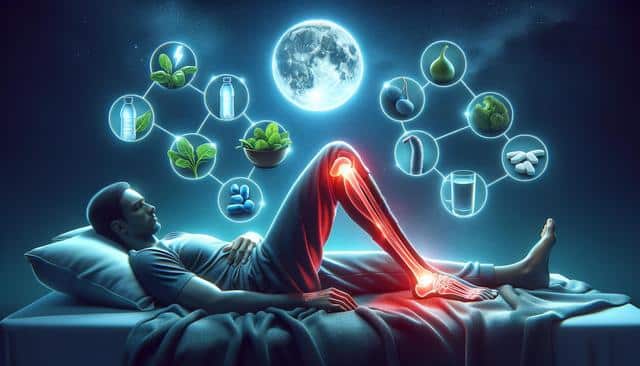Understanding Nighttime Leg Cramps: What Could Be Causing Them?
Leg cramps are sudden, sharp pains that can hit at night or with long sit times. Stretching, drinking water, or massaging the area may help. If cramps last or hurt often, see a doctor to find the cause.

Dehydration and Electrolyte Imbalance
One of the most common causes of leg cramps at night is dehydration. When the body lacks sufficient water, muscles can become more prone to cramping. This is especially true if you’ve been physically active during the day or have not replenished lost fluids. Alongside dehydration, an imbalance in electrolytes such as potassium, calcium, magnesium, and sodium can also lead to muscle cramps. These minerals help transmit nerve signals and maintain muscle function, and when their levels drop too low, the likelihood of cramps increases.
Some signs that may accompany dehydration or electrolyte imbalance include:
- Dry mouth or increased thirst
- Fatigue or dizziness
- Muscle twitching or spasms
- Dark-colored urine
To help reduce the risk of nighttime leg cramps due to hydration issues, it’s important to drink water consistently throughout the day and maintain a balanced diet rich in fruits, vegetables, and whole grains that naturally contain essential minerals.
Prolonged Inactivity or Poor Sleeping Position
Sitting or lying in the same position for extended periods can restrict blood flow and put pressure on nerves or muscles, leading to leg cramps. This is particularly relevant for those who sit at a desk for long hours or sleep in positions that keep the legs bent or compressed. Inactivity during the day can also contribute as muscles may become tight or weak from disuse.
To help prevent cramps caused by poor circulation or position, consider these tips:
- Stretch your legs before going to bed
- Take short walking breaks if you sit for long periods
- Try sleeping with a pillow under your knees if lying on your back, or between your knees if on your side
- Engage in regular light exercise like walking or swimming
Making these small adjustments can support better muscle function and improve overall comfort during sleep.
Medication Side Effects
Certain medications have been linked to muscle cramps as a side effect. Diuretics, often prescribed for high blood pressure or heart conditions, can cause the body to lose electrolytes through increased urination, leading to cramping. Other medications, such as statins or certain asthma drugs, may also contribute to nighttime leg cramps in some individuals.
If you suspect your medication might be contributing to your leg cramps, it’s important not to stop taking it without consulting your healthcare provider. Instead, discuss your symptoms and explore possible alternatives or supportive treatments. Your doctor may recommend:
- Adjusting your dosage
- Switching to a different medication
- Adding supplements to counteract lost minerals
Being aware of how your medications affect your body can help you and your doctor create a more comfortable and sustainable treatment plan.
Underlying Health Conditions
In some cases, nighttime leg cramps may be a symptom of an underlying health condition. Conditions that affect the nerves or blood vessels, such as peripheral artery disease (PAD), diabetes, or neurological disorders, can lead to muscle cramps. These conditions may impair circulation or nerve signals, which can trigger painful muscle contractions during rest.
Other health concerns that could be associated with frequent leg cramps include:
- Spinal issues such as spinal stenosis
- Chronic kidney disease
- Thyroid imbalances
If you experience persistent or severe leg cramps, especially alongside other symptoms like numbness, weakness, or swelling, it’s a good idea to consult a healthcare professional. Proper diagnosis and management of the underlying condition can often reduce or eliminate the cramping episodes.
Age and Muscle Fatigue
As we age, the likelihood of experiencing leg cramps at night tends to increase. Older adults often have reduced muscle mass and elasticity, making their muscles more susceptible to fatigue and cramping. Additionally, physical activity that overexerts the muscles—especially in those who are not used to consistent exercise—can lead to cramps later in the evening or during sleep.
To address cramps related to age or muscle fatigue, consider the following actions:
- Maintain a regular, moderate exercise routine
- Warm up and cool down properly around physical activity
- Focus on leg-strengthening and stretching exercises
- Ensure adequate rest between workouts to avoid overexertion
Listening to your body and gradually building up your activity levels can help prevent cramps caused by fatigue, while also improving general muscle health and resilience over time.
Conclusion: Paying Attention to the Root Cause of Leg Cramps
Nighttime leg cramps can be more than just a temporary annoyance—they may signal an underlying issue that deserves attention. From hydration and medication side effects to more serious health concerns, it’s important to consider all potential causes. Simple lifestyle changes, such as improving hydration, adjusting sleeping positions, and exercising regularly, can often bring relief. However, if cramps become frequent or severe, it’s wise to seek medical advice. Understanding and addressing the source of your leg cramps can lead to more restful nights and better mobility during the day.